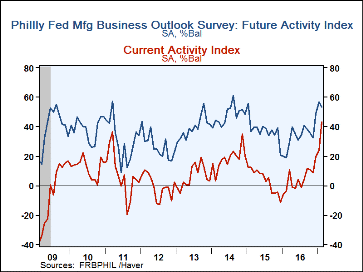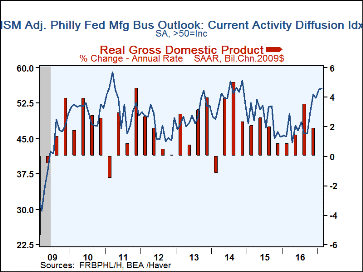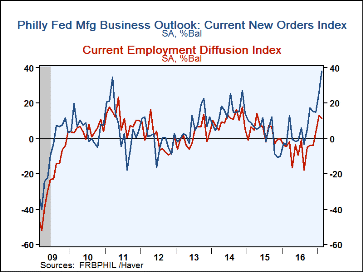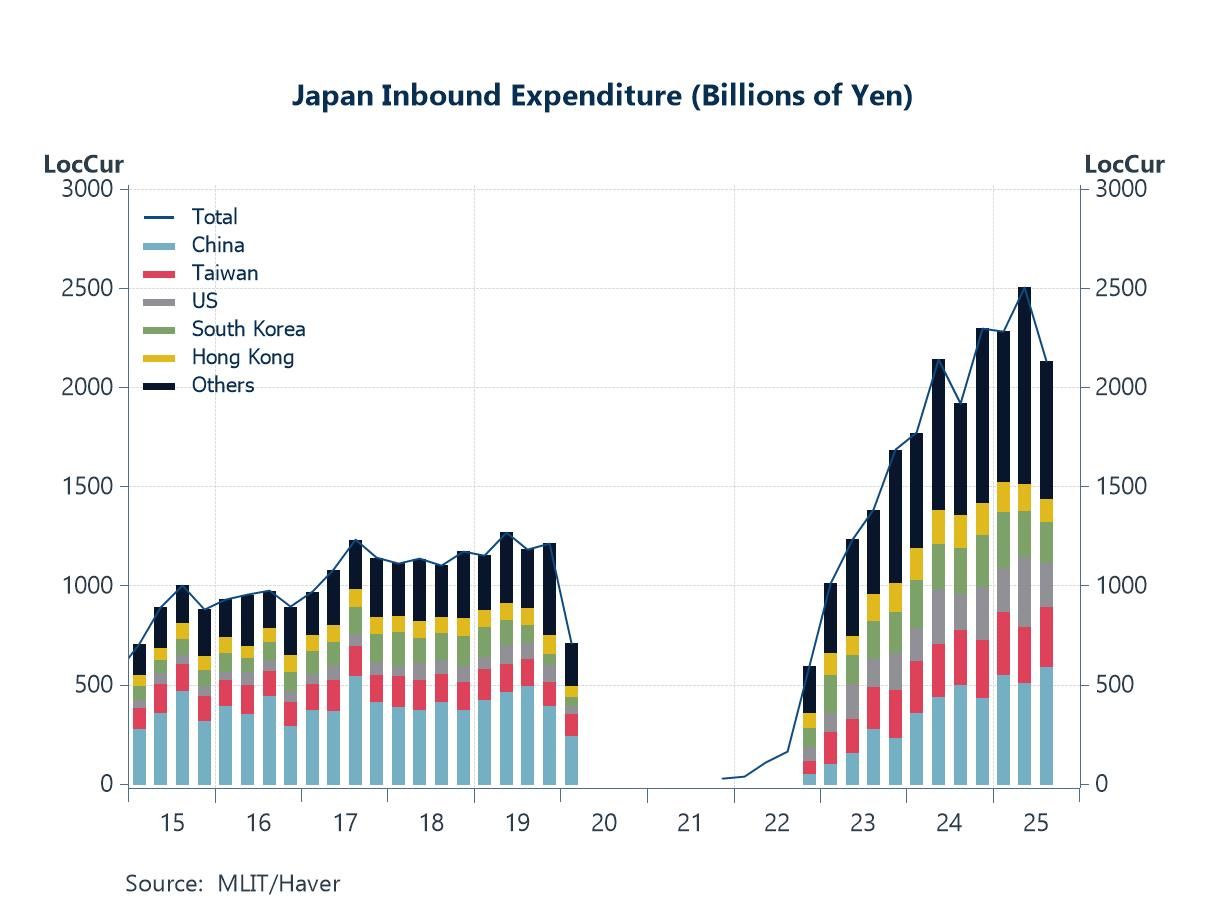 Global| Feb 16 2017
Global| Feb 16 2017Philadelphia Fed Factory Business Conditions Index Strengthens
by:Tom Moeller
|in:Economy in Brief
Summary
The Philadelphia Federal Reserve reported that its General Factory Sector Business Conditions Index jumped to 43.3 during February from January's 23.6. It was the highest level since January 1984. The latest monthly reading compared [...]
The Philadelphia Federal Reserve reported that its General Factory Sector Business Conditions Index jumped to 43.3 during February from January's 23.6. It was the highest level since January 1984. The latest monthly reading compared to expectations for 18.9 in the Action Economics Forecast Survey.
The ISM-Adjusted General Business Conditions Index constructed by Haver Analytics ticked higher to 55.6 this month, the highest level since November 2014. The ISM-Adjusted headline index is the average of five diffusion indexes: new orders, shipments, employment, supplier deliveries and inventories with equal weights (20% each). This figure is comparable to the ISM Composite Index. During the last ten years, there has been a 71% correlation between the adjusted Philadelphia Fed Index and real GDP growth.
Stronger new orders and production components led the way higher, as they surged to multi-year highs. Unfilled orders also held at the best level in six years. Delivery times eased, however, indicating quicker delivery speeds, while inventories fell.
The employment series slipped from its roughly two-year high. During the last ten years, there has been an 81% correlation between the jobs index and the m/m change in manufacturing sector payrolls. The average workweek reading strengthened to an expansion high.
Prices paid slipped from its recent high and prices received dropped sharply.
The future business activity index eased following its January surge. Most component series fell m/m, but remained near the highest levels of the expansion.
The survey panel consists of 150 manufacturing companies in Federal Reserve District III (consisting of southeastern PA, southern NJ and Delaware). The diffusion indexes represent the percentage of respondents indicating an increase minus the percentage indicating a decrease in activity. The ISM adjusted figure, calculated by Haver Analytics, is the average of five diffusion indexes: new orders, production, employment, supplier deliveries and inventories with equal weights (20% each). Each diffusion index is the sum of the percent responding "higher" and one-half of the percent responding "same."
The figures from the Philadelphia Federal Reserve can be found in Haver's SURVEYS database. The Action Economics figure is available in AS1REPNA.
Does Growing Mismeasurement Explain Disappointing Growth? from the Federal Reserve Bank of San Francisco can be found here.
| Philadelphia Fed - Manufacturing Business Outlook Survey (%, SA) | Feb | Jan | Dec | Feb'16 | 2016 | 2015 | 2014 |
|---|---|---|---|---|---|---|---|
| General Factory Sector Business Conditions | 43.3 | 23.6 | 19.7 | -3.8 | 4.8 | 3.6 | 18.3 |
| ISM-Adjusted Business Conditions | 55.6 | 55.5 | 53.6 | 45.5 | 48.2 | 49.4 | 53.7 |
| New Orders | 38.0 | 26.0 | 14.9 | -3.9 | 4.9 | 2.9 | 14.9 |
| Shipments | 28.6 | 20.5 | 21.7 | 3.7 | 6.9 | 3.1 | 16.3 |
| Unfilled Orders | 10.7 | 10.7 | 3.6 | -11.8 | -5.5 | -5.1 | 3.3 |
| Delivery Time | 4.1 | 5.4 | 5.4 | -15.4 | -4.6 | -4.1 | 0.6 |
| Inventories | -4.7 | 12.2 | 1.3 | -16.1 | -9.7 | -1.5 | 1.7 |
| Number of Employees | 11.1 | 12.8 | 3.6 | -4.4 | -5.7 | 3.9 | 10.5 |
| Prices Paid | 29.9 | 32.5 | 28.1 | -2.8 | 13.5 | 1.5 | 21.6 |
Tom Moeller
AuthorMore in Author Profile »Prior to joining Haver Analytics in 2000, Mr. Moeller worked as the Economist at Chancellor Capital Management from 1985 to 1999. There, he developed comprehensive economic forecasts and interpreted economic data for equity and fixed income portfolio managers. Also at Chancellor, Mr. Moeller worked as an equity analyst and was responsible for researching and rating companies in the economically sensitive automobile and housing industries for investment in Chancellor’s equity portfolio. Prior to joining Chancellor, Mr. Moeller was an Economist at Citibank from 1979 to 1984. He also analyzed pricing behavior in the metals industry for the Council on Wage and Price Stability in Washington, D.C. In 1999, Mr. Moeller received the award for most accurate forecast from the Forecasters' Club of New York. From 1990 to 1992 he was President of the New York Association for Business Economists. Mr. Moeller earned an M.B.A. in Finance from Fordham University, where he graduated in 1987. He holds a Bachelor of Arts in Economics from George Washington University.










